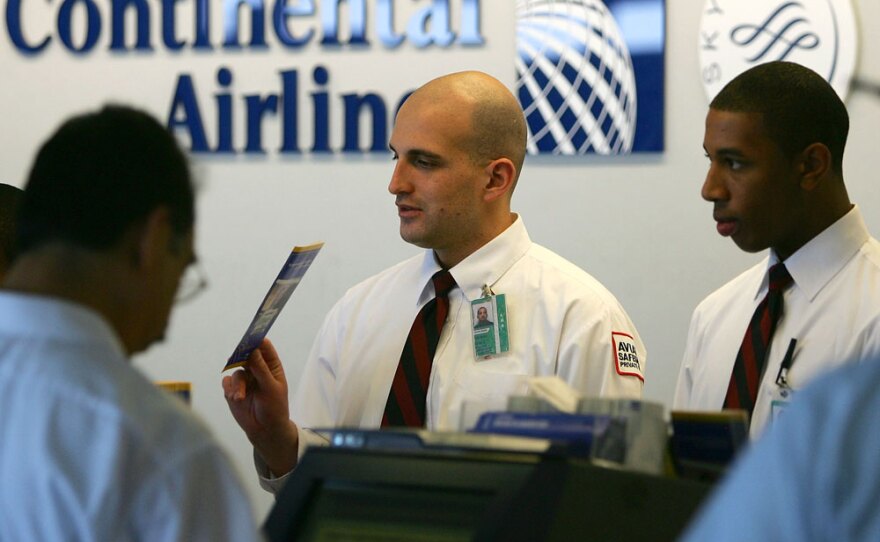The proposed megamerger of United and Continental airlines is being touted by the companies as a cost-saving, revenue-producing deal that would create a global powerhouse stretching from Asia to Latin America.
It's a hopeful prediction in an industry that has been unprofitable for most of the past decade.
But just what would the creation of the world's largest air carrier mean for American consumers -- from the coveted international business traveler, to folks just trying to visit Grandma one time zone away?
We got some answers from Terry Trippler of rulestoknow.com; Lori Ranson, coordinator of North American coverage for Airline Business Magazine; and Tom Parsons of bestfares.com.
Bottom line, does it look like consumers will win or lose if this merger is approved?
"If I were going to grade it, the overall picture is a B-plus," Trippler says. "The two airlines getting together are known for innovative in-flight service, and excellent customer service. Neither is coming out of Chapter 11, as were Delta and Northwest. And both have very solid, battle-tested international -- and complementary -- routes."
Parsons says there will be "some downsizing. But to those who predict higher fares because of mergers, I say hogwash. The airlines still have to compete."
How would the merger affect the number of flights and their prices?
"There will be some trimming of routes -- you can't avoid that," Trippler says. "But I believe that when it comes to fares, there's just as good a chance as that they will drop as increase. You're going to have three 800-pound gorillas out there fighting: the new United, American, and Delta, which recently merged with Northwest Airlines.
"They've all invested a tremendous amount of money in their international gateways. Anytime you have a battle for the passenger, the passenger wins," Trippler says.
Parsons says the combination means "you'll be able to fly the new United from almost anywhere you live in America. But there will be some downsizing of routes, and fewer opportunities to get premium seats. It's going to be tougher and tougher to cash in on frequent-flier miles.
"And you better believe that an airport like Chicago where United and Continental have 20 flights between them won't need as many. Where consumers may be most affected could be in places like Eugene, Ore., or Fargo, N.D., or Roanoke, Va. They're already paying a premium today, and, if anything, they'll see fares go higher," Parsons says.
Will consumers see domestic routes now operated by United and Continental ceded to the growing low-cost airline sector that includes Southwest, JetBlue, AirTran and Virgin?
"I think the lower-cost airlines will be increasingly approached by these huge legacy carriers to be feeders into their international gateways," Trippler says. "Already American has cut a deal with JetBlue in New York City. I see us reverting to the way carriers operated in the 1970s before airline deregulation: with the low-cost airlines serving as feeder airlines, bringing passengers to the trunk carriers for the longer flights."
Parsons adds: "Eighty percent of where people fly from in America is now served by a low-cost carrier."
Ranson says the United-Continental merger "would underpin the trend that the low-cost carriers will have more of the domestic share of the market, and the larger ones more of the international share. Your business passenger is the most lucrative passenger -- you're going to get a premium from the business traveler that travels long-haul routes."
Continental is known for its terrific customer service in a time when that's in short supply in the airline business. And United has made a name for some of its in-flight innovations. Can consumers expect the best of both to survive a merger?
"Hopefully -- because if you bring the best aspects of both, you could have one dandy airline," Trippler says.
"United is going to look very nice to business travelers, and Continental is going to bring its customer service to United," Parsons says.
These big mergers can get ugly -- you only have to look back at the acrimonious joining of US Airways and America West five years ago. And the union representing pilots at both United and Continental on Monday said that history shows that mergers are "always a difficult challenge." How could the flying consumer be affected by labor unrest?
"Labor is the battle, and it does trickle down to the consumer -- though nobody wants to admit it," Trippler says. "We just saw a Northwest-Delta merger that went very smoothly, but other than the pilots, there were no unions at Delta. US Airways and America West? They still haven't gotten it down -- they're still flying their same old routes."
Ranson adds, "Labor is going to be an issue -- it always is."
Copyright 2022 NPR. To see more, visit https://www.npr.org. 9(MDAzMjM2NDYzMDEyMzc1Njk5NjAxNzY3OQ001))







